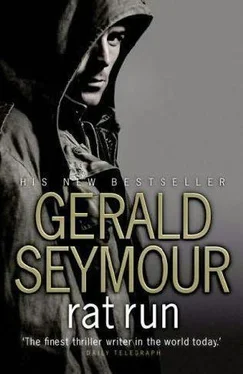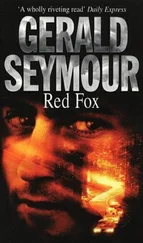Gerald Seymour - Rat Run
Здесь есть возможность читать онлайн «Gerald Seymour - Rat Run» весь текст электронной книги совершенно бесплатно (целиком полную версию без сокращений). В некоторых случаях можно слушать аудио, скачать через торрент в формате fb2 и присутствует краткое содержание. Жанр: Триллер, на английском языке. Описание произведения, (предисловие) а так же отзывы посетителей доступны на портале библиотеки ЛибКат.
- Название:Rat Run
- Автор:
- Жанр:
- Год:неизвестен
- ISBN:нет данных
- Рейтинг книги:4 / 5. Голосов: 1
-
Избранное:Добавить в избранное
- Отзывы:
-
Ваша оценка:
- 80
- 1
- 2
- 3
- 4
- 5
Rat Run: краткое содержание, описание и аннотация
Предлагаем к чтению аннотацию, описание, краткое содержание или предисловие (зависит от того, что написал сам автор книги «Rat Run»). Если вы не нашли необходимую информацию о книге — напишите в комментариях, мы постараемся отыскать её.
Rat Run — читать онлайн бесплатно полную книгу (весь текст) целиком
Ниже представлен текст книги, разбитый по страницам. Система сохранения места последней прочитанной страницы, позволяет с удобством читать онлайн бесплатно книгу «Rat Run», без необходимости каждый раз заново искать на чём Вы остановились. Поставьте закладку, и сможете в любой момент перейти на страницу, на которой закончили чтение.
Интервал:
Закладка:
'Myself, I'd do it if I could,' Harry shouted at the wheel-house door, at his son. 'I can't… What I'm promising, it's never again.'
'Just get her stern on, Dad, and keep her there.'
He should have been down on the deck to help his boy but dared not leave the wheel and the diesel engine's controls to young Paul, his grandson, who had retched again and was now too frail to hold the wheel steady and did not know the working of the engine. The door slammed behind him, but he yelled and did not know if he was heard.
'Don't hang about. You get there, you ground, you pick them up if they're there, but you don't wait. Their problem if they're not in place in the water – my conscience is clear that my word was kept.'
Harry reached up, worked the lever that manoeuvred the light on the wheel-house roof and hit the switch. In the flood of the beam, he could see his son and grandson heaving the dinghy off the bucking deck and on to the gunwale, resting it on the trawler's side, then – as a spray surge swamped them – pushing it over. On a wave, the dinghy – held by a straining rope – climbed higher than the gunwale, higher than them, then fell like the trough had no bottom to it. He had given his word to Ricky Capel, and his word was all the honour left to him. His son seemed to punch the shoulder of his grandson, as if to reassure the kid, who was destroyed by sickness, then launched himself over the side. Harry lost sight of him in the next pit, then saw him lifted in the dinghy, and the kid loosed hold of the rope.
He kept the light on the dinghy. He watched its progress, pathetically slow, and smoke fumes spat from the outboard. It rose and it fell. It was hard, one-handed, to hold the light on the dinghy and to keep the steering on the Anneliese Royal steady, to control the engine and bring the forward speed down from three knots forward to two knots. To his starboard side was the roll of the buoy light, the Accumer Ee on the chart, and to port were dulled blips of colour from the island's homes.
A prayer slipped on Harry's lips.
He held the wheel-house roof light on the dinghy and saw it shaken among the whitecaps and go towards the surf… Whatever it cost him, he swore that he would never again be Ricky Capel's slave.
He heard, 'About bloody time. You ready? We go, yes?
We don't hang about, not now.'
The world of Malachy Kitchen was now a tiny, confined space. His whole world was a dune with blown grass and soft sand, a beach, riffling surf and a light that wavered on the leaping progress of a dinghy. He felt cleansed, as if old baggage were dropped, and no one here would label him a coward. He coiled his body and made ready to run.
They were gone.
They went in a sliding chase down loose banks of sand. Little yelps of elation from Ricky Capel, like a child at play and happy, nothing from the man who led him.
The light on the boat at sea, perhaps because she was hurled up, wafted away and beyond the dinghy, and then raked over the surf and came on to the beach from which the tide ran, and Malachy saw them, saw that Capel had the box that was the radio, and that the second man carried a machine pistol that trailed loose in his hand. Malachy stood, but the light's beam did not reach him. It swung low, searched for the dinghy and found the breaking waves, then its target. They were off the loose sand, on the beach, and they ran away to his left towards a point that the dinghy headed for.
He had the tags in his hand, and he lifted the strap over his head: they were his name, his service number, his religion and his blood group, and they were his history. In his fist, fiercely clenched, Malachy held them.
Because he knew when he would hit, he waited a few long seconds more. He could not see them, only the dinghy.
He thought himself his own master, and all that was his old world were the shoes on his feet and the tags in his hand. He came off the dune and the sand plunged under his feet. He fell and pushed himself back to his feet. The wind blasted against him, the rain stung at his eyes, and he ran.
Shells crunched, broke, under the tread of his shoes.
He stretched his stride.
When the boat's light came up again, off the dinghy, it caught them – Ricky Capel behind and the second man in front of him – found them near to the surf line.
Neither looked back.
He pounded the beach. He careered through a lagoon of water. It was where he wished to be, a battleground that was perfect.
They were in the water. He saw them against the white sweep of the surf, and against the thunder of the breaking waves the voices were shouting, screaming.
'We're coming… Can't you get in bloody closer?'
'You got to come to me. I'm not bloody grounding.'
'Get in nearer.'
'Won't risk tipping her. Tip her and we're all bloody gone.'
'I can't goddamn swim.'
'If the engine goes under, we're wrecked. Come on, shift it.'
They were into the surf wall, Ricky Capel trailing.
Between the cresting waves, Ricky Capel had the water at his ankles and shins, but when the waves rolled at full height the water squirmed round his waist and seemed to drive him back. Malachy heard Ricky Capel's howl that he had lost a shoe. The man ahead never turned, never reached back with a hand to steady Ricky Capel, never tried to be of help.
Malachy splashed into the surf and the drive of his legs was blocked. He was lifting his knees, stamping for height over the surf, and was closing on Ricky Capel. He did not think why he was there, what he did, how Ricky Capel had become an enemy to be destroyed. The past was gone from his mind. He struggled against the wind's force, against the waves.
He saw that Ricky Capel had stopped and he thought exhaustion had beaten him. Malachy seemed to hear the sob of Ricky Capel's breath. The gap had opened between the two men, as if contact had been lost, and beyond both of them – riding and falling in the water, lit by the light – was the dinghy. He took the deep gulp, swallowed air into his lungs. He closed on Ricky Capel – five more strides, then three – and the water beat against his waist. A new wave came that pitched up the dinghy, ran against the other man's chest, lurched into Ricky Capel, and charged Malachy. As he braced himself, he threw back over his shoulder the two tags, and did not twist to see them fall. He had no more use for them, or for the past, and did not hear their splash. Malachy lunged. His fists snatched at space, and spray, and then his weight hit Ricky Capel.
He came without warning, and the momentum driven by the grip of his shoes collapsed Ricky Capel.
Perhaps Ricky Capel, in the two or three seconds between feeling the hammer blow against his back and being forced under the surf, tried to shout.
Underwater, in darkness, Malachy gripped the thrashing body and fingers gouged at his eyes and a bare foot kicked at his shin – and the height of a wave passed and the wind surged on their faces.
The light lit them.
He saw the shock in the eyes of Ricky Capel, as if he did not understand why, then the squirm of fear as if he remembered a man on the pavement of Bevin Close. The scream was choked, and water spat from his mouth. The next wave caught them, and the fight had gone from Ricky Capel. Hands grasped at
Malachy's coat, then his trousers, then his shoes, then loosed.
He stood. He felt the weight, pushed by the surf, against his ankles.
The man was at the dinghy, but had turned.
Malachy did not hear the weapon, but saw the flashes from it, and the man climbed easily up and into the dinghy. He felt a weakness in his legs and in his hips… and was aware of vague shouts from the dinghy, then the roar of its outboard gaining power, and felt himself sink. It did not seem important to him that the sea closed over him, then freed and lifted him, covered him, then carried him… so tired.
Читать дальшеИнтервал:
Закладка:
Похожие книги на «Rat Run»
Представляем Вашему вниманию похожие книги на «Rat Run» списком для выбора. Мы отобрали схожую по названию и смыслу литературу в надежде предоставить читателям больше вариантов отыскать новые, интересные, ещё непрочитанные произведения.
Обсуждение, отзывы о книге «Rat Run» и просто собственные мнения читателей. Оставьте ваши комментарии, напишите, что Вы думаете о произведении, его смысле или главных героях. Укажите что конкретно понравилось, а что нет, и почему Вы так считаете.












